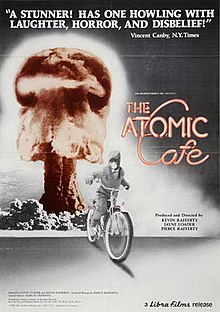The Atomic Café
| The Atomic Cafe | |
|---|---|

Theatrical release poster
|
|
| Directed by |
Jayne Loader Kevin Rafferty Pierce Rafferty |
| Produced by | Jayne Loader Kevin Rafferty Pierce Rafferty |
| Written by | Jayne Loader Kevin Rafferty Pierce Rafferty |
| Music by |
Consultant: Charles Wolfe |
| Edited by | Jayne Loader Kevin Rafferty |
|
Production
company |
The Archives Project
|
| Distributed by | Libra Films |
|
Release date
|
|
|
Running time
|
86 minutes |
| Country | United States |
| Language | English |
The Atomic Cafe is a 1982 American documentary film produced and directed by Jayne Loader, Kevin Rafferty and Pierce Rafferty.
In 2016, the film was selected for preservation in the United States' National Film Registry by the Library of Congress, being deemed "culturally, historically, or aesthetically significant".
The film covers the beginnings of the era of nuclear warfare, created from a broad range of archival material from the 1940s, 1950s and early 1960s including newsreel clips, television news footage, U.S. government-produced films (including military training films), advertisements, television and radio programs. News footage reflected the prevailing understanding of the media and public.
Though the topic of atomic holocaust is a grave matter, The Atomic Cafe approaches it with black humor. Much of the humor derives from the modern audience's reaction to the old training films, such as the Duck and Cover film shown in schools. A quote to illustrate what can be perceived as black humor, culled from the movie: "Viewed from a safe distance, the atomic bomb is one of the most beautiful sights ever seen by man," a U.S. Army training film declares.
The Atomic Cafe was released at the height of nostalgia and cynicism in America. By 1982, Americans lost much of their faith in their government following the Vietnam War, the Watergate scandal, and the seemingly never-ending arms race with the Soviet Union.The Atomic Cafe reflects and reinforces this idea as it exposes how the atomic bomb’s dangers were downplayed (President Truman calls the atomic bomb a gift from God) and how the government used films to shape public opinion.
The Atomic Cafe was also released during the Reagan Administration’s forced civil defense revival. Barry Posen and Stephen Van Evera explain this revival in their article “Defense Policy and the Reagan Administration: Departure from Containment” published in International Security. They argue that in 1981–82 the Reagan Administration was moving from an essentially defensive grand strategy of containment to a more offensive strategy. Due to the greater demands of its more offensive strategy “the Reagan Administration ... proposed the biggest military buildup since the Korean War.” Of key relevance to The Atomic Cafe, the Reagan move toward offense included the adoption of a more aggressive nuclear strategy that required a large U.S. nuclear buildup. Containment only required that U.S. strategic nuclear forces be capable of one mission: inflicting unacceptable damage on the Soviet Union even after absorbing an all-out Soviet surprise attack. To this "assured destruction" mission the Reagan administration added a second "counterforce" mission, which required the capacity to launch a nuclear first strike against Soviet strategic nuclear forces that would leave the Soviets unable to inflict unacceptable damage on the U.S. in retaliation. The U.S. had always invested in counterforce but the Reagan administration put even greater emphasis on it. The counterforce mission was far more demanding than the assured destruction mission, and required a vast expansion of U.S. nuclear forces to fulfill. Civil defense was a component of a counterforce strategy, as it reduced Soviet retaliatory capacity, hence civil defense was a candidate for more spending under Reagan's counterforce nuclear strategy. Posen and Van Evera argue that this counterforce strategy was a warrant for an open-ended U.S. nuclear buildup.
...
Wikipedia
